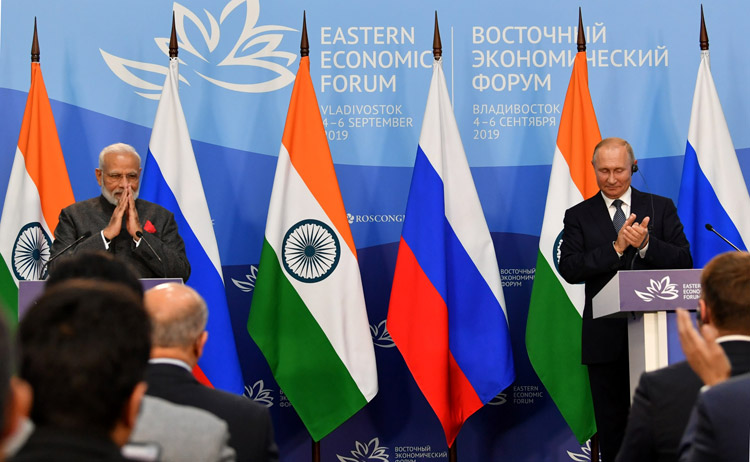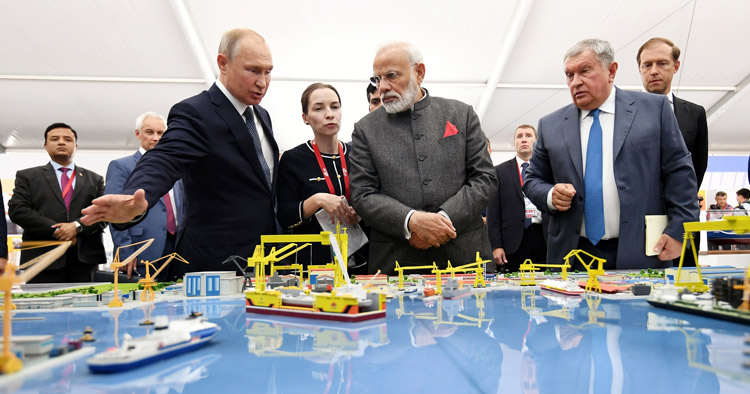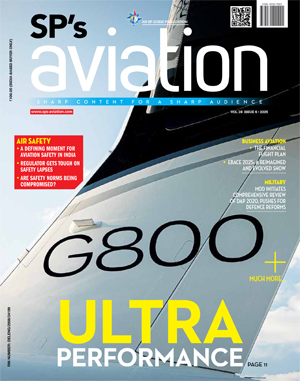INDIAN ARMED FORCES CHIEFS ON OUR RELENTLESS AND FOCUSED PUBLISHING EFFORTS

The insightful articles, inspiring narrations and analytical perspectives presented by the Editorial Team, establish an alluring connect with the reader. My compliments and best wishes to SP Guide Publications.

"Over the past 60 years, the growth of SP Guide Publications has mirrored the rising stature of Indian Navy. Its well-researched and informative magazines on Defence and Aerospace sector have served to shape an educated opinion of our military personnel, policy makers and the public alike. I wish SP's Publication team continued success, fair winds and following seas in all future endeavour!"

Since, its inception in 1964, SP Guide Publications has consistently demonstrated commitment to high-quality journalism in the aerospace and defence sectors, earning a well-deserved reputation as Asia's largest media house in this domain. I wish SP Guide Publications continued success in its pursuit of excellence.
- Prime Minister Modi Visits Punjab’s Adampur Air Base, Interacts with Airmen after Successful ‘Operation Sindoor’; Stern Message to Pakistan
- The layered Air Defence systems that worked superbly, the key element of Operation Sindoor
- Operation Sindoor | Day 2 DGMOs Briefing
- Operation Sindoor: Resolute yet Restrained
- India's Operation Sindoor Sends a Clear Message to Terror and the World – ‘ZERO TOLERANCE’
- Japan and India set forth a defence cooperation consultancy framework, talks on tank and jet engines
20th India-Russia Annual Summit
 |
The Author is Former Director General of Information Systems and A Special Forces Veteran, Indian Army |

Prime Minister Narendra Modi attended the 20th Annual India-Russia Annual Bilateral Summit in Vladivostok, Russia and the 5th Eastern Economic Forum as the Chief Guest on September 4-5. Before departing for Russia, Modi had said that strong bilateral partnership is complemented by a desire to promote a multi-polar world, he looked forward to discussing regional and international issues of mutual interest with President Putin, and his visit underlines the desire of the two countries to diversity and further strengthen bilateral relations. Modi also said he looked forward to meeting other global leaders attending the Eastern Economic Forum, and interacting with Indian Industry and business representatives participating in it, since the forum focuses on development of business and investment opportunities in the Russian Far East Region, and presents enormous potential for developing close and mutually beneficial cooperation between India and Russia in the region. Modi and Putin held extensive bilateral discussion spanning multifarious issues on September 4. Both leaders noted progressive development of the Special and Privileged Strategic India-Russia Partnership, based on time-tested friendship, mutual understanding, trust and common interest.
Modi also visited the 'Zvezda' shipbuilding complex and later had dinner with President Putin. Agreements and MoUs signed during Modi's visit included:
- Joint statement 'Reaching New Heights of Cooperation through Trust and Partnership';
- Joint strategy for the Enhancement of India-Russia Trade and Investments;
- Cooperation in production of spare parts for Russian/Soviet military equipment;
- Cooperation in Audiovisual Co-production;
- Cooperation in road transport and road industry;
- Development of maritime communications between the Chennai and Vladivostok;
- Cooperation in combating customs violations;
- Natural Gas Transportation;
- Expanding cooperation in oil and gas sector;
- Cooperation in coking coal mining projects implementation in the Russian Far East;
- Investment collaboration between Invest India and Russian Direct Investment Fund;
- Cooperation between FICCI and Roscongress Foundation;
- Strategic Initiatives to promote new projects;
- Development of downstream LNG Business and LNG supplies, and:
- Cooperation between Joint-Stock Company Rosgeologia and Srei Infrastructure Finance Limited.

Important highlights of the joint statement included: bilateral ties not susceptible to outside influence; intensive inter-parliamentary interaction cooperation important; prioritising strong, multifaceted trade and economic cooperation; trade turnover progressing well, aim being $30 billion by 2025; expand Russian participation in 'Make in India' and Indian investments in Russia; work towards eliminating barriers in mutual trade; promoting mutual settlements of payments in national currencies to continue; satisfaction over Indian companies developing Russia's Far East region; India looks forward to cooperate with Russia in the Arctic; civil nuclear cooperation important component of strategic partnership; immense potential for cooperation in non-nuclear fuel and energy, geological exploration and joint development of oil and gas fields; develop ways to deliver energy resources from Russia to India; expand cooperation in hydro and thermal power, energy efficiency and non-conventional energy; further trade, economic ties, and development of International North-South Transport Corridor (INSTC); cooperation in railways, direct passenger and cargo flights between regions, agriculture, joint research in science and technology, aviation and space - Russia supports India's mission 'Gaganyaan' including training astronauts; cooperation in diamond industry; upgrade defence cooperation including joint development and production of military equipment, components and spare parts, joint exercises; institutionalize reciprocal logistic support and services for both militaries; enhance military-to-military cooperation - Joint Tri-Services Exercise INDRA-2019 to be held in India; cultural exchanges, tourism and educational cooperation; strengthening of multilateralism, coordinating role of UN, reform of UNSC, Russian support for India's candidacy for permanent membership UNSC, strengthen partnership within BRICS, RIC and G20; cooperation in ICT security; strengthen Biological and Toxins Weapons Convention (BTWC); support Organization for Prohibition of Chemical Weapons (OPCW); strengthen non-proliferation - Russia supports India's membership of NSG; support for Afghan-led, Afghan-owned Afghanistan reconciliation; implementation of Joint Comprehensive Plan of Action on the Iranian Nuclear Programme; peaceful dialogue for denuclearised Korean Peninsula; cooperation in third countries especially Central Asia, South East Asia and Africa; strengthen WTO and implement 2030 Agenda, and; equal and indivisible security architecture in Asia-Pacific region. Before Modi's visit to Vladivostok, media had speculated that a number of defence deals would be placed on the table by Russia, including: or discussed during the bilateral summit, like: 200 x Kamov Ka-226T helicopters costing over $1 billion; Russian offer of conventional submarines for Indian Navy's Project-75I;joint development of Su-57 FGFA; Russia's newest MiG-35 for the IAF with ToT, and; $4.5 billion T-14 Armata tank as multi-purpose replacement for both T-72 tanks and ICVs of Indian Army. No details have been released about any defence deals that were signed during Modi's visit. However, according to Dmitry Shugaev, head of Russia's Federal Service of Military Technical Cooperation (FSVTS), India has ordered arms and military equipment from Russia worth $14.5 billion. Obviously, the 'Make in India' and use of currencies of both countries would come into play.
PM Modi invited President Putin to visit India next year for the 21st India-Russia Annual Summit, which Putin accepted. Also, PM Modi has accepted Putin's invitation to attend the 75th anniversary of victory of Russian federation in World War-2 in May 2020 in Moscow. The slew of agreements between the two countries, including military and technical cooperation, energy and science, LNG business and LNG supplies, and natural gas, 20 more Russian nuclear units being set up in India, the maritime route linking Chennai and Vladivostok, besides mutual cooperation in space, ICT security, convergence of strategic regional and global have given a big boost to the Special and Privileged Strategic India-Russia Partnership. The future of the bilateral relationship is indeed very bright.





